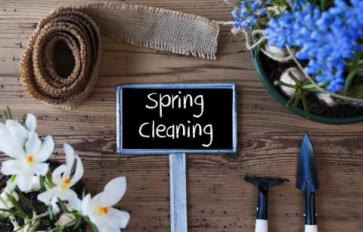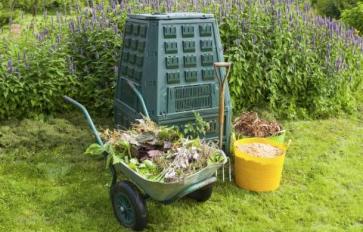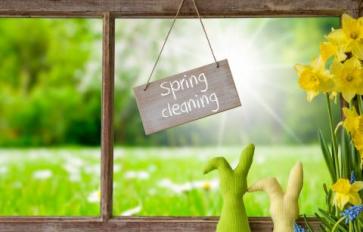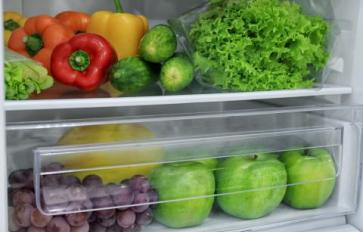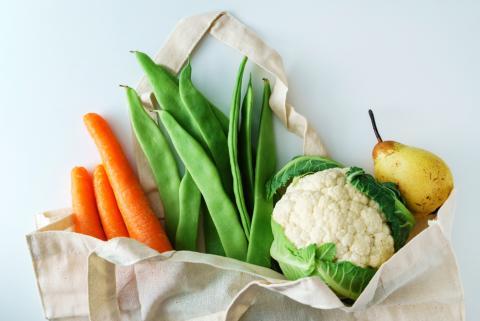
Imagine a world where weekly garbage pickup didn't happen. Would you still make as much trash every day, knowing it would eventually consume your entire sidewalk, possibly even your home? We often forget how privileged we are to have garbage pickup services—not everyone is so lucky. We give very little thought to what happens to our garbage when it's sent away. The truth is, it doesn't go away. It goes to landfills, likely located in poor communities, where it emits toxic gasses bad for people's health and the earth. That's why I do my best to live a zero-waste life: I want to put an end to the endless cycle of consumption and waste.
What is zero waste & why live a zero-waste life?
First off, I'd like to begin by saying there is no such thing as being "truly zero waste." This is because of our linear economy, where waste is bound to happen somewhere along the line. No matter how much you refuse it or avoid it, it will sneak up on you. And, for now, that's okay. It doesn't mean you give up: It just means you acknowledge our need for a more circular economy.
In nature, everything is cyclical. From the seasons to the life of a gazelle, everything rotates around in the circle of life. There is an ecosystem that balances everything out. For instance, when an animal dies, it decomposes and becomes part of the soil and grass, giving nourishment to them. As Mufasa from The Lion King said: "When we die, our bodies become the grass, and the antelope eat the grass. And so we are all connected in the great Circle of Life."
Unfortunately, humans think they can break this law. Plastic is not so cyclical: It cannot decompose, but instead, just breaks down into tinier pieces over time called microplastics. These microplastics absorb harmful toxins and contaminate everything they touch from water to earth to animals. And plastic cannot be recycled infinitely: In fact, most isn't recycled at all. Only 9 percent of plastic actually ends up being turned into something else. Considering humans have generated more than 8.3 billion metric tons of plastic since plastic production began, that's a lot of plastic waste.
This is where zero-waste living comes in: To avoid contributing to all this, we reduce the amount of trash we create on the daily. This means buying fresh produce without packaging, shopping in bulk food stores using mason jars, investing in reusable (and easy to recycle) items, and avoiding disposables whenever we can.
It's not about being perfect, it's about making a difference. Starting off by swapping out plastic straws for reusable straws (or no straws at all) is a great way to start. You don't have to take the leap in a day. Zero waste does not happen overnight.
Generally speaking, zero wasters abide by these "rules" (though they're constructive and allow room for growth):
- Refuse—This simply means refusing single-use plastics (for example, straws) and single-use paper products (for example, paper towels) in place of reusables.
- Reduce—Reducing what you're purchasing by being mindful of what you truly need and will actually use is another easy way to decrease your waste output.
- Reuse—Get lots of use out of your items by reusing them over and over again, making sure to keep them in great condition and repairing them when needed.
- Rot—Compost your food scraps in your abode or find a food scrap drop off location to let them rot the natural way.
- Recycle—Make sure any plastic, paper, or metal that comes into your life is properly recycled by researching your state's recycling laws and abiding them.
What are the benefits of living a zero-waste life?
There are several benefits to living a zero-waste life (other than the satisfaction of knowing your actions better the planet). Going zero waste has saved me a ton of money. Think about this: Disposables constantly need to be replaced when they run out. If you have a big family, you're bound to go through a lot of paper towels, napkins, and plastic water bottles, if you use them often. That really adds up in the financial department. For explanatory purposes, let’s suggest one case of bottled water costs $5 (without tax), an 8 pack of paper towels is $10 (without tax) and a pack of paper napkins cost $6 (without tax). If your family buys these items once a month, it'll come out to an additional $21 a month, which turns into $252 a year. That's assuming you don't buy these items more than once a month! If you buy them two times a month, that's $42 a month, $504 a year. See how this can quickly add up? This doesn't even take into account other disposable expenses, such as sanitary pads, plastic cutlery, paper plates, etc. Switching to reusable items you only have to buy once and can keep reusing will save you a ton of cash in the long run.
Another benefit of going zero waste is how good cutting out plastic is for your health. Plastic is full of chemicals that can harm our health. That's because plastic is made from refined crude oil and contains chemicals such as BPA (Bisphenol-A) which can disrupt reproductive development and functions. There's been a lot of research to suggest people who had high levels of BPA in their system had increased rates of a number of serious health issues, including diabetes, heart disease, and liver toxicity. That said, it's important to note that BPA isn't the only problem. A lot of items are starting to be labeled "BPA-free" but usually that just means they're replaced with other chemicals, such as BPS (Bisphenol-S) and phthalates. These still pose a health risk, especially when used to package food (which is usually where you'll find them). By simply avoiding plastic altogether, and going zero waste, you'll be doing your health so much good and avoiding these risks.
There honestly aren't many downsides to living a zero-waste life. I will admit I've gotten a few judgmental looks, but no one has been outright rude. Every once in a while someone will ask me why I don't want plastic when I refuse it, but I use it as an opportunity to talk about plastic pollution. It can be a real conversation starter, and a way to get people interested! Most people are sadly just completely unaware this is a problem in the first place.
How do I live zero waste?
Remember those Refuse, Reduce, Reuse, Rot, and Recycle rules? Here's how I abide by them and some actionable steps you can take to make your life a little less wasteful:
- On the go—I've invested in a few select reusable items that have made my life so much more zero waste. My main go-tos are my reusable water bottle, travel mug, utensil set, straws, napkins, and tote bag. When I'm on the go, I make sure I have all these essentials with me. I carry them in my sling over bag (made from cloth) and take them out whenever I need them. It leaves me prepared for any situation. Also, if eating out, I usually finish all the food on my plate (I always order just enough). That said, if you have any leftovers, or know you usually don't finish your meals, take a reusable container (mason jar or metal tiffin works fine) with you and put your leftovers in there. No single use plastic needed.
- At home—While at home, the biggest way I cut back on waste is by composting. I live in an apartment, with my folks, so they don't like the idea of a compost bin very much. Instead, I use a compost pail with a built-in filter that keeps everything stink free. Any food I cannot finish on my plate, or any food scraps (like egg shells, peeled veggies, ends of veggies, fruit pits, etc.) get tossed in there. We then take the food scraps to the farmers market every Saturday where they have a food scrap drop off location. Another way we stay zero waste at home is by keeping a lot of rags and hand towels around. This cuts down on paper towel usage (though paper towels and napkins can be composted!). We use orange peel-infused white vinegar to clean around the house (it makes a great all-purpose cleaner). And of course, needless to say, we use reusable plates, cutlery, and glasses at the dinner table every night. In the bathroom, I use a bamboo toothbrush, homemade toothpaste, DIY deodorant, and DIY mouthwash. Yes, I still use toilet paper (we just try to buy the ones that come wrapped individually in paper, instead of plastic, to cut back on waste).
- Shopping—I don't go shopping too much anymore. After going zero waste, I've found very little need to (I've minimalized a lot). Instead, I simply use what I have. However, I do go grocery shopping with my folks a lot. Every Saturday, my mom and I go to the farmers market. We can get a ton of plastic-free produce there. We simply put it in our reusable cloth produce bags, then place everything into our big tote bags. Usually, 8 to 9 produce bags are enough, and 3 tote bags are plenty. No waste created! For dry goods, we go to a health food store near us that has a bulk food section. Using my own glass jars, I scoop the food into the jars (we tend to get flour, spices, teas, nuts, seeds, granola, dried fruit, and grains the most). Then I get them weighed and plop them into my own bag (I use a wine bag—it has dividers in it that help keep the jars stable). Easy, efficient, and affordable. As far as luxury items go, like beauty products, I typically look for ethically made products that come in sustainable packaging (glass, paper, cardboard, metal tins). When I buy these items, I ask them to put it in my own reusable bag.
- Get-togethers—At family parties or friend get-togethers, I always try to ask the hostess for a reusable plate, along with some reusable cutlery. If I don't want to bother them for a cup, I'll just drink from my reusable water bottle. They usually have no problem with this, especially when I offer to clean it myself when I'm done. As long as you ask politely, they'll probably oblige (I've never been turned down before). If you're at an event you don't really know many people at, or don't feel comfortable at, stay near the finger foods. If you're given plastic cups, utensils, and plates, try to hold on to the same one throughout the entire night to reduce the waste you produce.
These are my tips and tricks (which I follow on a daily basis). I hope they inspire you to do the same. Just remember, it's okay if you slip up or aren't perfect. Just make it a goal to do better next time.



